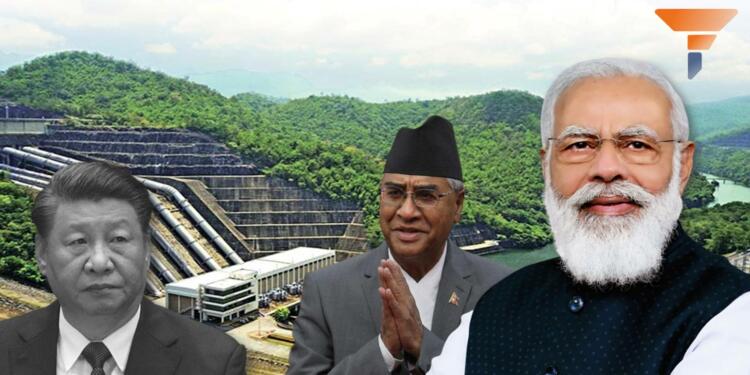Ahead of Prime Minister Narendra Modi’s trip to Lumbini, Nepal next week, Kathmandu has decided to ditch the Chinese camp and initiate talks with India for the development of the West Seti Hydropower Project. The proposed 750-megawatt West Seti Hydropower Project, which is to be built on the Seti river in far-western Nepal has remained in hibernation for six decades over investment concerns. The decision to go with an Indian company comes in the backdrop of big Chinese hydro companies being snubbed by the Nepalese government led by pro-India Prime Minister Sher Bahadur Deuba who is proceeding with an unapologetic ‘India-first policy’.
According to Nepalese media reports, Prime Minister Sher Bahadur Deuba is keen to grant the contract to an Indian company to satiate New Delhi which does not want to deal with any Chinese company associated with the hydropower projects.
Deuba was quoted as saying by The Kathmandu Post, “We failed to invest in this project. So, during the visit of Prime Minister Modi, we will take up the matter with him. Since India is reluctant to purchase energy produced by Chinese companies in Nepal, we will talk with Modi for the engagement of Indian developers.”
The Nepalese PM also added, “There is the need for a decisive negotiation with a reliable Indian company for the development of the project. We need to invest in storage-type projects for energy security in the dry season [winter].”
According to Deuba, besides West Seti, the government has decided to hold talks with India to develop the Pancheshwar Multipurpose project too. Thus, it has been hinted that some kind of understanding could be reached with India during Deuba’s meeting with PM Modi on May 16 in Lumbini.
Big Chinese hydropower companies were associated with the West-Seti project
It is pertinent to note that China National Machinery and Equipment Import and Export Corporation (CMEC) and Three Gorges International Corporation (China’s biggest hydropower developer) have been associated with the West Sati project for long spells but failed to make any headway as Kathmandu reeled from the corruption of the Chinese companies.
Since the new government led by Sher Bahadur Deuba came to power in Nepal, the country dumped Communist China in order to pursue its centuries-old relationship with India. When KP Sharma Oli was Nepal’s Prime Minister, China seemed to be in charge of Nepal’s political affairs.
The paper dragon crossed all limits of diplomatic decency and interfered deeply in the internal affairs of the Nepal Communist Party which was in power at the time. China was reducing Nepal into a client country and looking to swallow it with its debt trap.
Read More: Oli out, Deuba in: The new Nepalese Prime Minister is pro-Hindu, pro-India and bad news for China
Nepal is snubbing China under a pro-India Sher Bahadur Deuba
Nepal was one of the first South Asian countries to get on board with China’s BRI. However, its experience so far has been painful or precarious, to say the least. Multi-billion dollar projects had been commissioned by the Chinese under Oli’s era without any transparency which has caused tremendous loss to the country’s exchequer already.
Even before BRI, in 2011, China promised to build the Budhi Gandaki hydro project by 2022. However, to date, the construction has not even started as the Chinese continue to dillydally the project. The Chinese simply want to annex parts of Nepal through its dubious scheme and get closer to India. It used the strategy to good effect by making former Prime Minister KP Sharma Oli dance to its tunes.
Read More: India to spearhead 75 development projects in Nepal this year
BRI projects in the mud
However, immediately after taking charge, Deubaformed a five-member committee to analyse its border dispute with China in Nepal’s Humla district. Headed by the joint secretary of the Ministry of Home Affairs, the committee has been ordered to present its report to the government on the border conflict.
As a result, over 90 per cent of Chinese projects in Nepal are said to have been stalled in the last 6-7 months, despite intense lobbying and meetings by Ambassador Hou Yanqi, who allegedly had KP Sharma Oli wrapped around her fingers. The Chinese Ambassador has thus lost her mojo.
Read More: Nepal’s Sher Bahadur Deuba government has dumped Chinese projects entirely
Reportedly, the projects already a part of BRI are facing stiff resistance from the aware local Nepalese citizens, who are outrightly objecting to Chinese investment in the region, knowing well and truly that Jinping and his CCP (Chinese Communist Party) want to ensnare the Himalayan nation into its debt-trap.
In an interview with ‘The Sunday Guardian Live’ Nepal’s former Deputy Prime Minister and senior leader, Rajendra Mahto remarked, “The BRI project is at an early stage. Before going ahead with the Belt and Road Initiative in Nepal, we have to think a lot. Wider consultation in the country, between various stakeholders and the common population is needed. Is the BRI useful for Nepal?”
New Delhi to inaugurate 75 development projects in Nepal
If New Delhi indeed decides to invest in the West Sati project reported, it will be in line with its promise of inaugurating 75 development projects in Nepal by August 2023 in order to mark the 75th anniversary of Indian independence. The Modi government has grand plans for the 75th year of Indian Independence and it has already started Azadi Ka Amrit Mahotsav to celebrate this glorious occasion.
New Delhi by reiterating that it will not buy any hydroelectricity if any Chinese component is involved in any capacity whatsoever has effectively forced Beijing out of the contract talks.
























